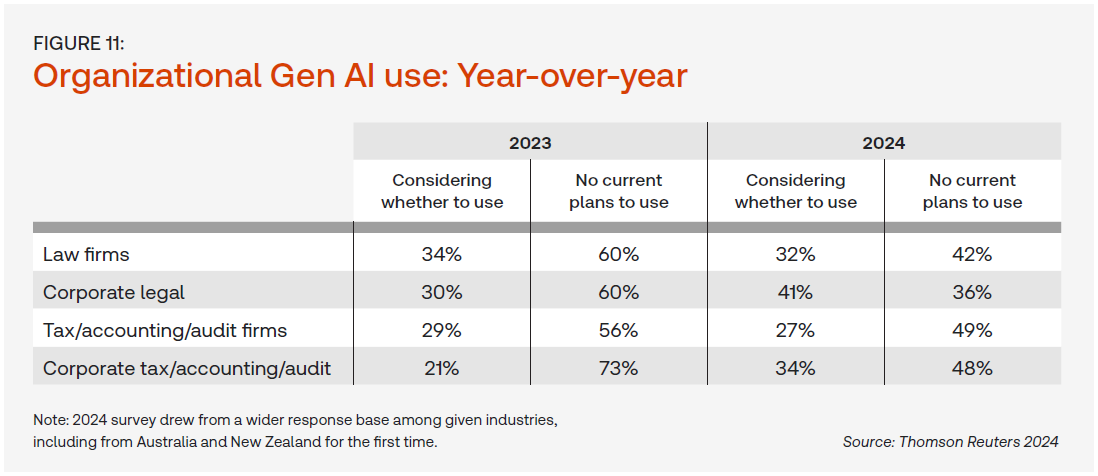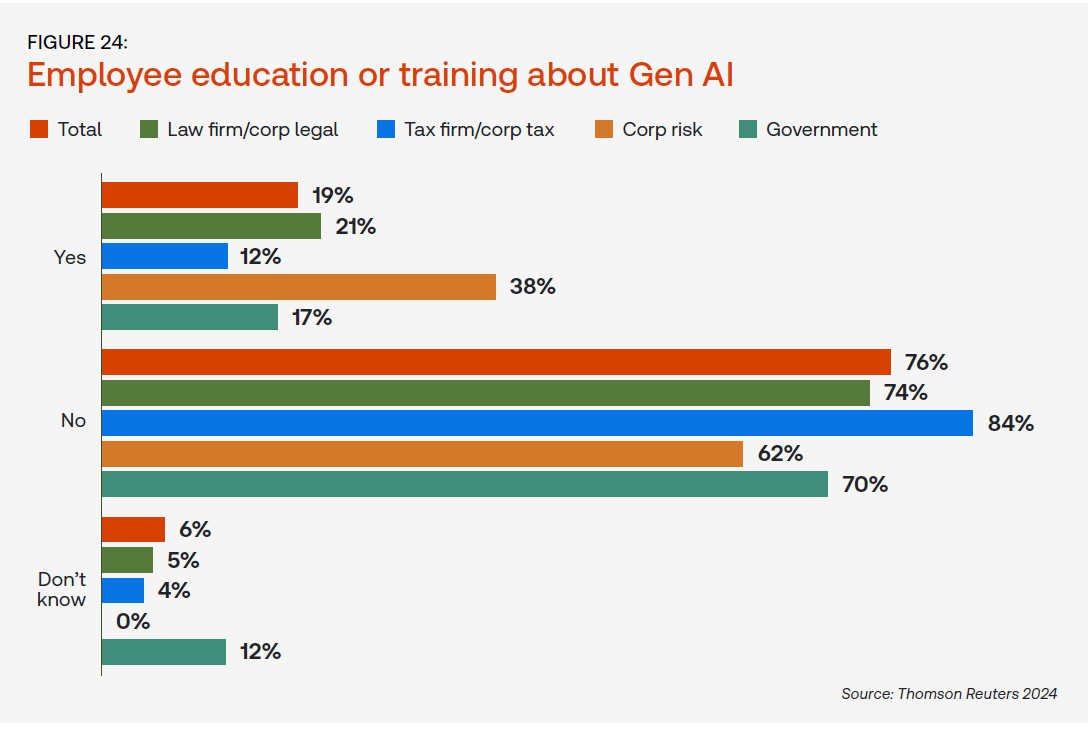A recent report found that a majority of corporate tax professionals believe GenAI can and should be used for tax work — as many begin the process of integration, however, they’re doing so without proper GenAI education
Is the generative artificial intelligence (GenAI) revolution set to hit corporate tax departments? Corporate tax professionals believe the possibility is here, but departments may not be ready for wide-scale adoption.
By and large, corporate tax departments have spent the past 18 months or so understanding what GenAI might mean for standard tax & accounting workflows. What they’ve found is a technology that could impact a number of daily operations — from simple tasks such as automating data entry and classifying tax documents to the more complex work of assisting with predicting tax liabilities and providing decision support for tax planning.
At the same time, however, the corporate tax world sees a number of barriers to actually utilizing this technology. Some of these barriers are technological, with tax departments needing to collect and organize their data in a way that it can actually be used. Other barriers are cultural and human-centric, with technology training remaining a low priority, and concerns around GenAI’s accuracy, privacy, and regulation stifling potential trial runs.
A recent report from the Thomson Reuters Institute, 2024 Generative AI in Professional Services report, finds a corporate tax world perhaps more ready for a steady evolution than a full revolution. While many corporate tax professionals said they believe that GenAI has a future in transforming the industry, adoption remains low for the time being, and there remains milestones to overcome before tax departments feel fully comfortable using the technology internally or encouraging its use with outside providers.
Usage and opinions
Currently, most corporate tax professionals not only see the use cases for GenAI in tax work, but they also actively believe GenAI eventually will become a part of their daily work in the future.
More than three-quarters (81%) of those surveyed answered affirmatively that GenAI can be applied to tax work, for instance, while just 3% answered that it cannot, and an additional 16% answered that they did not know, according to the report. Adjusting the question slightly to ask whether GenAI should actively be applied to tax work, a majority of corporate tax respondents still answered affirmatively — 60% said yes, 13% said no, and the remainder said they did not know.
“Most tax accountants are not great writers,” said one US corporate tax manager. “They are excellent with numbers and calculations, but I think generative AI can help with some of our shortcomings and make our written output much stronger.”
Despite these positive sentiments towards GenAI’s future, however, current usage remains low. On a company-wide level, just 5% of corporate tax professionals said their organizations were integrating GenAI into their work — the lowest total of any type of professional found in the survey. Additionally, 13% said their organizations were working on plans to integrate GenAI.
Even with the current low rate of adoption, however, there remains some belief that those numbers may soon change. About one-third (34%) of respondents said their organizations were considering whether or not to integrate GenAI, while 48% said they had no plans for current use. That represents a marked shift in approach from 2023, when a similar report found that more than 70% of corporate tax respondents said they had no plans for current use.

Personal usage of GenAI tools also remains higher than organization-wide usage, and there is reason to believe that will also increase in the coming years, particularly as GenAI features become integrated into common tax technology tools. One-quarter (25%) of corporate tax respondents said they are already personally using public-facing tools such as ChatGPT, for instance, while only 8% say they are using tax-specific GenAI tools. That number could soon even out however, as an additional 38% said they plan to use tax-specific GenAI tools within the next three years.
This growth potential is compounded by the number of potential uses corporate tax professionals are already finding for GenAI tools. The following use cases were identified by more than one-third of respondents who said they were already using or are planning to use GenAI tools:
-
-
- accounting and bookkeeping;
- tax research;
- compliance;
- tax return preparation;
- document review and summarization; and
- filling out financial statements.
-
Some survey respondents also said they are already beginning to see results. “We are always short on people and resources, and every minute we can free up people could be used for more value-added activities,” explained one US corporate tax manager.
Barriers to entry
There remains a number of barriers that could potentially limit GenAI’s immediate reach in corporate tax departments, however. To be sure, some of the barriers are technological — corporate tax respondents noted their top two barriers to GenAI adoption were concerns about data security and the potential for inaccurate responses. Half of respondents also pointed to privacy and confidentiality of the information that’s entered into GenAI tools as a barrier.
These concerns are likely to be lessened as GenAI is baked into tax-specific technology tools. Indeed, GenAI tools of the near future are likely to be sectioned behind a company’s own security firewall and have more stringent rules are privacy. In addition, the accuracy of GenAI tools likely will increase in coming years, and individual tax tools also are likely to become more accurate by training the system against a trusted data set.
Even with these concerns lessened, however, there remains a large area that could limit GenAI’s ultimate impact: the people using the tool. More than half of corporate tax respondents expressed concerns about users becoming too dependent on the technology, leading to a reduction in critical thinking and creativity. Just less than half (42%) said their organizations had a lack of skills and resources to implement GenAI tools, while 31% said their departments had an aversion to change — a higher proportion than either the corporate legal (24%) or corporate risk (19%) departments.
Further, these problems are compounded by the fact that many tax departments are short-handed in other areas, making resources for GenAI a potentially tough sell. “Really hoping that generative AI can help with accounting tasks that are currently too manual and time-consuming,” noted one Australian corporate tax controller. “Recruiting new staff is currently challenging as well due to staff shortages everywhere in Australia.”
According to the research data, however, change concerning how internal personnel approach GenAI may occur slowly due to a lack of education found within corporate tax departments. In fact, just 10% of corporate tax respondents said their organization offered training around GenAI — the lowest of any professional service surveyed within the report.

If GenAI truly has a future in the corporate tax world, it will not solely be a function of its own advancement. Tax departments leaders who want to encourage adoption and proper use of GenAI will need to focus on the people and process of implementation and use the technology itself. Training and education will be paramount for gaining the benefits of the next generation of technology, and ongoing change management programs will be crucial for making sure GenAI is used properly with privacy, security, and accuracy in mind.
“It’s great to be able to experience the technological advancements of AI,” explained one Canadian corporate tax manager. “While there are certain social and ethical issues and concerns that need to be addressed, I’m hopeful that all of the issues and concerns can be worked out to allow for the future of great technology.”







